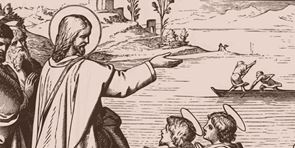Was Jesus a genius?
Article
7th February 2024

Jesus never wrote a book, and yet his teachings have influenced billions throughout history. Peter Williams investigates the genius behind the Gospels.
Over the years thousands of people have been described as geniuses. Aristotle (384–322 BC), Leonardo da Vinci (1452–1519), Wolfgang Amadeus Mozart (1756–1791), and Albert Einstein (1879–1955) are among the more famous ones. But the term ‘genius’ is almost never applied to Jesus of Nazareth.1
Probably about two billion Christians would claim to follow his teachings, which is more than follow the teachings of any other person in history. But most of the Christians I mix with would be more likely to see Jesus’s intelligence as a necessary corollary of his divine nature than to point to specific things he said as examples of remarkable intellect. When Jesus is viewed as a teacher, as Christian philosopher Dallas Willard wryly comments in his book The Divine Conspiracy (William Collins, 1998) ‘Frankly, he is not taken to be a person of much ability.’
One reason others are seen as geniuses but Jesus is not could be what they have left behind. Aristotle left books of philosophy and analysis; da Vinci, inventions and exquisite paintings; Mozart, sublime music; Einstein, theories that are foundational for modern physics. And Jesus? He never wrote a book. But could we say that he left Christianity behind? The problem is that its art, history, institutions, philosophy, and so on are often regarded as a response to Jesus, not something he himself thought up. At least we can agree that many things under the label of Christianity have nothing at all to do with the teachings of Jesus.
I would argue that Jesus should be considered a genius, not merely because a vast number of people today claim to follow him but also because of the cleverness and wisdom of his teaching. The teaching attributed to him combines impressive factual knowledge with even more impressive depth of insight, coherence, and simplicity. He was literally able to teach two groups with very different knowledge levels simultaneously. Evidence for Jesus’s teaching is found in the four earliest records of Jesus, the four Gospels: Matthew, Mark, Luke, and John. It is well worth investing the nine hours or so it takes to read all four of them once. In fact, speaking from experience, I can say that it is rewarding to study them for an entire lifetime. If you have doubts about whether they can be taken as serious historical sources, I invite you to read my short book Can We Trust the Gospels? (Crossway, 2018).
To follow my argument here, you do not need to believe that Jesus said all the things credited to him in the Gospels. All you need to believe is that the sayings attributed to Jesus come from within living memory of him, remembering that even leading skeptical scholars date the Gospels to the first century. Jesus Christ was executed while Pontius Pilate was the Roman governor of Judea (AD 26–36), and if the Gospels were all written by AD 100 (personally, I think they were much earlier), the gap between Jesus and the Gospels is both short enough for them to be thoroughly reliable and long enough for them to be thoroughly unreliable. The length of time alone does not therefore tell us about the degree of their reliability. Only an examination of the Gospels themselves can answer this question.
Was Jesus a rather ordinary teacher with brilliant students who selflessly credited him with their great ideas? Or was Jesus a very smart teacher with, coincidentally, smart disciples, and therefore the credit should be shared? Or was Jesus himself the genius, and to the extent that his disciples showed themselves intelligent, they were simply reflecting the greatness of their teacher? I find the last explanation best.
1 An exception is the recent motivational book by Erwin Raphael McManus, The Genius of Jesus: The Man Who Changed Everything (Convergent, 2021).